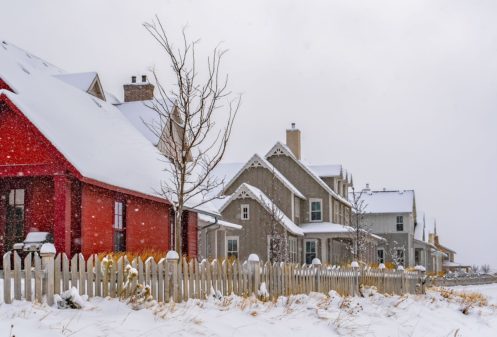When cold snaps come to the Denver, CO area, local news sources put out reminders to prepare your plumbing for freezing conditions. Does this same advice apply to your propane or natural gas lines, though?
Liquid Propane and Natural Gas: Pressure and Temperature
Both natural gas and propane are compressed into liquid form for transport and storage. To do this at atmospheric pressure requires extremely low temperatures. However, Amonton’s law shows that there is a relationship between both the pressure and the temperature of most gases. This principle illustrates that you can also lower the temperature of a gas by increasing the pressure of the container where it is stored. This allows fossil fuel manufacturers to keep natural gas and propane in a less volatile liquid state for transport and to significantly reduce the volume for storage purposes.
Winter Storms, Natural Gas, and Propane
During the 2020 winter storm in Texas, the power grid failed in many places, and news pieces about the gas pipelines freezing up could be found on the airwaves as explanations as to why so many people had heating issues. However, the truth of the issue was much more complicated than this explanation allowed for.
The actual freezing of natural gas or propane just from a gas into a liquid at atmospheric pressures requires significantly low temperatures below — 40 degrees Fahrenheit. Not only is it unlikely that air temperatures will reach this point for a long enough time for this to happen, but natural gas lines throughout a city are typically stored underground, an environment that provides temperature control even when air temperatures are cold. In extremely cold environments, gas lines are buried deeper underground below the typical depth at which soil freezes in the area. This makes it very unlikely that frozen gas in the lines themselves was the cause of problems during this storm.
Instead, there are other issues that occur with keeping gas supplies where they are needed at cold temperatures. Often, natural gas is stored in a holding facility that is connected to infrastructure that can provide this resource to a municipal or suburban area. During winter storms, there is a higher demand than normal for this resource, and these holding facilities must be refilled more often than is typical.
Winter weather can make the transport of this natural gas more treacherous. Processing plants that separate natural gas from refineries into propane and methane may be limited on the power needed to complete this task if it is produced locally. Logistical snags such as this may not literally freeze the gas in the pipes, but they may hinder the process of getting natural gas refills to where they’re needed most during winter storms.
Cold Weather Preparations for Homeowners That Use Natural Gas
If you are a homeowner who uses natural gas, there are some things that you can do to prepare your home for cold weather. First, check your natural gas lines and fittings for signs of corrosion. Make sure that all of your valves turn on and off easily. If you find corrosion or if your valves don’t close or open fully, speak to your local HVAC professional who services natural gas lines. They can inspect and repair any lines or valves that are causing problems before the cold begins. Finally, this is a good time to replace the batteries in the carbon monoxide detectors near your gas-burning appliances or to buy and install some for added safety.
Cold Weather Preparations for Homeowners With Propane Tanks
Propane is similar to natural gas in many respects though the method of storage and delivery of propane is more likely to be local, and natural gas is more likely to be a municipal resource. To prepare your propane system for cold weather, check your lines and valves as described above for natural gas. Also, consider the same preparations with replacing batteries or adding carbon monoxide detection systems. Finally, there are a few things that you can examine on your propane tank that are different from city piping that provides natural gas.
To check that your propane tank is not leaking, turn off all of the items in your home that run on propane. If there is a shutoff valve near the appliance or other item that uses propane, turn this off as well. If you can do this on a day when you don’t need to use propane, you can check for slow leaks by making note of the gauge level in the morning, leaving all items closed off for most of the day, and then checking again in the evening.
Propane gauges are often measured in high-level percentages and don’t move much, so consider putting a mark on the gauge needle to help detect subtle changes and smaller leaks. Of course, a professional has more sophisticated equipment to find leaks and to detect the small traces of gas in the air that would confirm your suspicion.
Consider topping off your propane tank before the cold weather sets in. The cold weather can lower the pressure in your propane tank, which can affect the delivery of the gas, so topping up is a good idea. Before the winter season begins, ensure that you have a clear path for a refueling truck to reach your propane tank during icy weather.
Unsafe Practices for Gas and Propane Systems
If you are concerned that your natural gas line or propane tank is not delivering enough gas, never put a heat source on the pipe to warm it up and increase the pressure inside of the gas line. While hair dryers and other sources of warmth can help with frozen pipes full of water, they can be very dangerous when used to heat highly flammable gases.
Additionally, never bring any propane tank into the home for use. While the large outdoor tank is too large to relocate into the home, appliances that run on portable propane tanks are not rated for indoor use. The burning of propane in outdoor appliances creates byproducts that affect indoor air quality if not used in an area where the gases can dissipate freely.
Fall Maintenance for Natural Gas and Propane Appliances
Maintenance for gas and propane-powered devices offers another opportunity to check for leaks and effectiveness in your propane or gas lines. Working with a professional allows you the opportunity to ask questions or bring up concerns about the gas that you use or your heating or cooking systems that rely on gas. This may give you the opportunity to address small issues early and save yourself the cost of expensive repairs or replacements.
Work With the Pros to Keep Your Gas Lines Working Well
Summit Heating & A/C in Denver is your local expert when it comes to winterizing your gas and propane lines. You can also call us for repair, maintenance, and installation of furnaces, heat pumps, air conditioners, water heaters, air purification systems, and mini-splits. Denver residents have relied on us for leak detection, sewer repair, plumbing replacement, and gas line installation and repair since 1998. Reach out today to learn more.


